Filter by

Infrastructural brutalism :art and the necropolitics of infrastructure
"Infrastructural Brutalism explores the necropolitics of infrastructure through the lens of artistic media: "drowned town" literature, road movies, energy landscape photography, and "death train" narratives. How does American "drowned town" literature, from Mud on the Stars to Sugaree Rising, contribute to the social erasure of Indigeneity? How does road movie scholarship ignore the materiality…
- Edition
- -
- ISBN/ISSN
- 0262358735
- Collation
- 1 online resource.
- Series Title
- -
- Call Number
- -
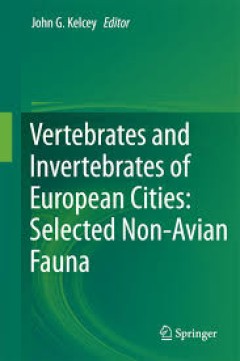
Vertebrates and Invertebrates of European Cities:Selected Non-Avian Fauna
Vertebrates and Invertebrates of European Cities: Selected Non-Avian Fauna is the first known account of the vertebrate and invertebrate fauna of several cities in Europe and throughout the rest of the world. It excludes birds, which are described in a companion volume. The book contains eleven chapters about nine cities distributed throughout Europe. The chapters start with the history of the …
- Edition
- -
- ISBN/ISSN
- 978-1-4939-1698-6
- Collation
- -
- Series Title
- -
- Call Number
- -
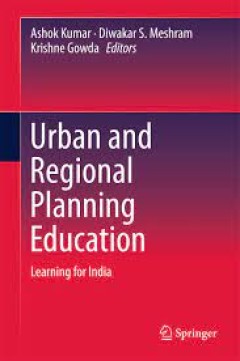
Urban and Regional Planning Education Learning for India
This is the first volume exclusively dedicated to planning education, with a focus on India and learning from global experiences for India. Prior to the 1990s, planning education in India was largely confined to national and local economic concerns. Within a globalized scenario, such pedagogies and theories have become outmoded. With new concerns emerging in planning, new pedagogical tools and …
- Edition
- -
- ISBN/ISSN
- 978-981-10-0608-1
- Collation
- -
- Series Title
- -
- Call Number
- -
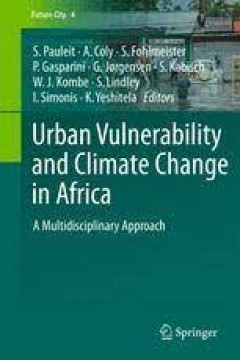
Urban Vulnerability and Climate Change in Africa A Multidisciplinary Approach
Urbanisation and climate change are among the major challenges for sustainable development in Africa. The overall aim of this book is to present innovative approaches to vulnerability analysis and for enhancing the resilience of African cities against climate change-induced risks. Locally adapted IPCC climate change scenarios, which also consider possible changes in urban population, have been …
- Edition
- -
- ISBN/ISSN
- 978-3-319-03982-4
- Collation
- -
- Series Title
- -
- Call Number
- -
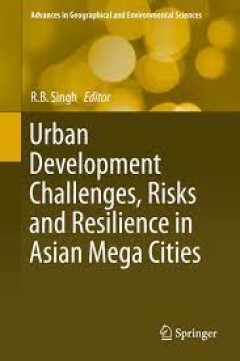
Urban Development Challenges, Risks and Resilience in Asian Mega Cities
In this book, an interdisciplinary research group of faculty members, researchers, professionals, and planners contributed to an understanding of the dynamics and dimensions of emerging challenges and risks in megacities in the rapidly changing urban environments in Asia and examined emerging resilience themes from the point of view of sustainability and public policy. The world’s urban popul…
- Edition
- -
- ISBN/ISSN
- 978-4-431-55043-3
- Collation
- -
- Series Title
- -
- Call Number
- -
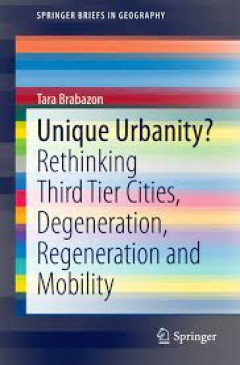
Unique Urbanity? Rethinking Third Tier Cities, Degeneration, Regeneration an…
This book investigates small cities - cities and towns that are not well known or internationally branded, but are facing structural economic and social issues after the Global Financial Crisis. They need to invent, develop and manage new reasons for their existence. The strengths and opportunities are often underplayed when compared to larger cities. These small cities do not have the profile …
- Edition
- -
- ISBN/ISSN
- 978-981-287-269-2
- Collation
- -
- Series Title
- -
- Call Number
- -

Isurium Brigantum: an archaeological survey of Roman Aldborough
Brings together in one volume for the very first time the results of a major re-examination of the site of the Roman town of Isurium Brigantum (Aldborough, in North Yorkshire), with recent geophysical surveys and a re-evaluation of earlier antiquarian work and archaeological fieldwork and excavations – some never before published. Provides historians and archaeologists with exciting new infor…
- Edition
- Ed. 1
- ISBN/ISSN
- -
- Collation
- 202
- Series Title
- Reports of the Research Committee of the Society of Antiquaries of London, LXXXI (81)
- Call Number
- 930.1 FER i
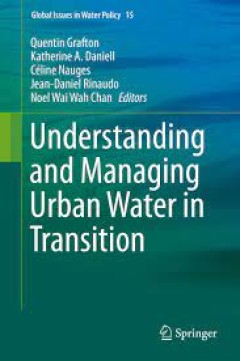
Understanding and Managing Urban Water in Transition
This book examines changes and transitions in the way water is managed in urban environments. This book originated from a joint French-Australian initiative on water and land management held in Montpellier, France. The book delivers practical insights into urban water management. It links scientific insights of researchers with the practical experiences of urban water practitioners to understan…
- Edition
- -
- ISBN/ISSN
- 978-94-017-9801-3
- Collation
- -
- Series Title
- -
- Call Number
- -

Complexity and dynamics Settlement and landscape from the Bronze Age to the …
How did people organize their settlements in later prehistoric societies? How do architecture, spatial organization, land divisions, and landscape use relate to different modes of social organization? The papers in this book contribute to a greater understanding of the complexity and dynamics of settlement and landscape organization in the Nordic countries from the Late Bronze Age to the Renais…
- Edition
- -
- ISBN/ISSN
- 9789464270440
- Collation
- -
- Series Title
- -
- Call Number
- -
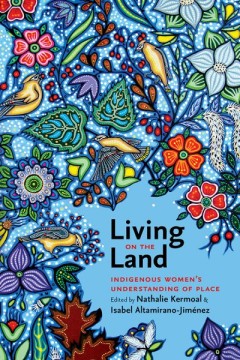
Living on the Land Indigenous Women's Understanding of Place
An extensive body of literature on Indigenous knowledge and ways of knowing has been written since the 1980s. This research has for the most part been conducted by scholars operating within Western epistemological frameworks that tend not only to deny the subjectivity of knowledge but also to privilege masculine authority. As a result, the information gathered predominantly reflects the types o…
- Edition
- -
- ISBN/ISSN
- 9781771990417.01
- Collation
- -
- Series Title
- -
- Call Number
- 228 pages
 Computer Science, Information & General Works
Computer Science, Information & General Works  Philosophy & Psychology
Philosophy & Psychology  Religion
Religion  Social Sciences
Social Sciences  Language
Language  Pure Science
Pure Science  Applied Sciences
Applied Sciences  Art & Recreation
Art & Recreation  Literature
Literature  History & Geography
History & Geography